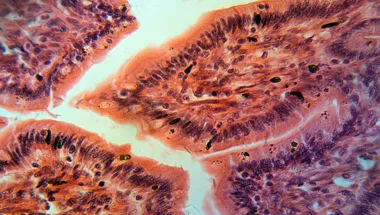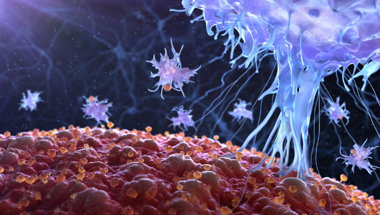
Professor Debashis Sarker
Professor of Experimental Oncology
Research interests
- Cancer
Contact details
Biography
Debashis Sarker is Professor of Experimental Oncology within the Comprehensive Cancer Centre and Consultant Medical Oncologist at Guy's, St Thomas' and King's College Hospitals. His main research interests are in first-in-human development of novel molecularly targeted agents, molecular and cellular immunotherapies and is the co-lead of King’s Health Partners Experimental Cancer Medicine Centre. He specialises in management of liver, pancreatic and neuroendocrine cancers with a particular focus in developmental therapeutics and genomics. He is the clinical co-lead at NHSE South East Genomic Medicine Service and Laboratory Hub and is the Deputy Director of NIHR Guy’s and St Thomas Clinical Research Facility.
Research

Programme in Gastrointestinal Cancer
The Programme in GI Cancer focuses on GI tract diseases, mostly cancer and oesophago-gastric cancer. This group spans a broad field of interests, promoting collaborative working within KCL, nationally and internationally.

Cancer Early Phase Trials Unit
Led by Professor James Spicer, Dr Debashis Sarker and Dr Rebecca Kristeleit, the Cancer Early Phase Trials Unit focuses on the discovery and development of novel molecular and cellular cancer immunotherapies.

Experimental Oncology
The Experimental Oncology Programme is focused on the development of new treatments for solid tumours.
Project status: Ongoing

King’s Health Partners ECMC
King’s Health Partners ECMC focuses particularly on new Molecular and Cellular cancer immunotherapies, building on recent translation of agents discovered in King’s laboratories.

School of Cancer & Pharmaceutical Sciences: People and Culture
The School of Cancer and Pharmaceutical Science People and Culture committee is committed to fostering an equitable, diverse, and inclusive research and education environment, where everyone can thrive. We strive to support and empower members of our community, by promoting accessibility, representation, and a culture of belonging. Through advocacy, education, and meaningful action, we aim to remove barriers, address systemic inequities, and create opportunities for our whole community to contribute and succeed

Sanchez-Fueyo & Safinia Lab - Liver Immunology, Transplantation & Hepatobiliary Neoplasms
Professor Alberto Sanchez-Fueyo and Dr Niloufar Safinia lead a translational research group focused on developing novel immunomodulatory therapies to ameliorate inflammation and induce immunological tolerance in liver diseases and transplantation. The research group’s expertise includes cell therapy and engineering, regulatory T cell (Treg) biology, and immunometabolism.
News
Experimental mRNA cancer vaccine shows potential for advanced stage cancer patients
Interim data from the Phase I dose escalation part of the mRNA cancer immunotherapy (mRNA-4359), show promise in patients with advanced solid cancers.

COVID reforms in cancer care and research could have long-term benefits
A new review led by Professor James Spicer considers the reforms in cancer care and research made due to the pandemic, arguing that some have left a positive...

Experimental cancer treatments receive funding boost
King's Health Partners (KHP) Experimental Cancer Medicine Centre (ECMC) has had its funding renewed for the next five years.

Events

Inaugural Lectures: Professors Debashis Sarker & Hiva Fassihi
Inspiring talks from two of our new professors about their work, their specialisations, and their journeys to where they are today.
Please note: this event has passed.
Research

Programme in Gastrointestinal Cancer
The Programme in GI Cancer focuses on GI tract diseases, mostly cancer and oesophago-gastric cancer. This group spans a broad field of interests, promoting collaborative working within KCL, nationally and internationally.

Cancer Early Phase Trials Unit
Led by Professor James Spicer, Dr Debashis Sarker and Dr Rebecca Kristeleit, the Cancer Early Phase Trials Unit focuses on the discovery and development of novel molecular and cellular cancer immunotherapies.

Experimental Oncology
The Experimental Oncology Programme is focused on the development of new treatments for solid tumours.
Project status: Ongoing

King’s Health Partners ECMC
King’s Health Partners ECMC focuses particularly on new Molecular and Cellular cancer immunotherapies, building on recent translation of agents discovered in King’s laboratories.

School of Cancer & Pharmaceutical Sciences: People and Culture
The School of Cancer and Pharmaceutical Science People and Culture committee is committed to fostering an equitable, diverse, and inclusive research and education environment, where everyone can thrive. We strive to support and empower members of our community, by promoting accessibility, representation, and a culture of belonging. Through advocacy, education, and meaningful action, we aim to remove barriers, address systemic inequities, and create opportunities for our whole community to contribute and succeed

Sanchez-Fueyo & Safinia Lab - Liver Immunology, Transplantation & Hepatobiliary Neoplasms
Professor Alberto Sanchez-Fueyo and Dr Niloufar Safinia lead a translational research group focused on developing novel immunomodulatory therapies to ameliorate inflammation and induce immunological tolerance in liver diseases and transplantation. The research group’s expertise includes cell therapy and engineering, regulatory T cell (Treg) biology, and immunometabolism.
News
Experimental mRNA cancer vaccine shows potential for advanced stage cancer patients
Interim data from the Phase I dose escalation part of the mRNA cancer immunotherapy (mRNA-4359), show promise in patients with advanced solid cancers.

COVID reforms in cancer care and research could have long-term benefits
A new review led by Professor James Spicer considers the reforms in cancer care and research made due to the pandemic, arguing that some have left a positive...

Experimental cancer treatments receive funding boost
King's Health Partners (KHP) Experimental Cancer Medicine Centre (ECMC) has had its funding renewed for the next five years.

Events

Inaugural Lectures: Professors Debashis Sarker & Hiva Fassihi
Inspiring talks from two of our new professors about their work, their specialisations, and their journeys to where they are today.
Please note: this event has passed.
